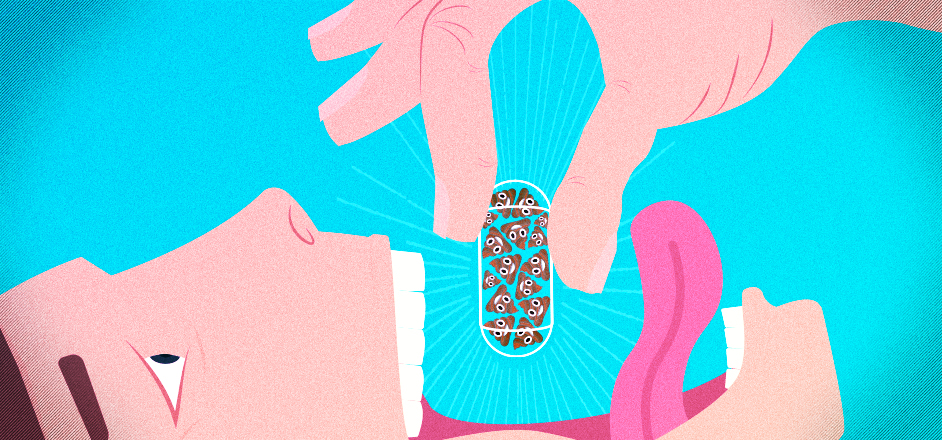Imagine having severe diarrhea every day, living in diapers, guts twisting in pain. You’re nauseous all the time, and your body has gotten so frail you’re confined to a wheelchair. Dozens of specialists are clueless about what’s wrong; all prescribe courses of antibiotics as a go-to treatment, each as ineffective as the last.
Then, one doctor tells you to eat shit.
Welcome to the wonderful world of fecal microbiota transplants.
The condition described above is a severe bacterial infection known as C. difficile, or C. diff, an ailment notorious for its staying power. C. diff often targets people who have been taking antibiotics, and therefore have a less diverse population of microbes defending their guts from invasive bacteria. It’s a sickness that sneaks in and takes over the entire gut microbiome, causing those debilitating symptoms like cramping and diarrhea.
A legitimate cure, however, is to ingest small amounts of another person’s fecal matter, effectively replacing the nasty microbes in the gut with healthy ones from a donor’s gut: thus, a fecal microbiota transplant, or FMT.
For as effective as it is, it’s actually quite simple. A stool sample can be frozen and placed in gelatin capsules, which a patient takes orally. The sample can also be blended up and inserted into the colon via an enema or colonoscopy — or transferred right into the gut via a tube down the throat.
Such was the case for a woman called “Rebecca,” whom science journalist Ed Yong discusses in his groundbreaking book on microbes, “I Contain Multitudes.” Rebecca suffered from persistent C. diff until she consented to ingest a stool sample from her husband. Miraculously, she recovered in under a month.

As Yong puts it, FMT’s are like “returfing a lawn that’s been overrun by dandelions.” After the procedure, Rebecca’s ravaged gut looked almost exactly like her husband’s healthy one.
The success stories don’t end there. Gastroenterologist Dr. Josbert Keller conducted a randomized clinical trial in 2013 known as the “Fecal Trial,” in which FMT’s cured 94 percent of patients afflicted with C. diff compared to the 27 percent cured by the antibiotic vancomycin.
Dr. Elaine Petrof, a professor at Queen’s University, has also treated a C. diff patient successfully using a FMT. She is now working to create precise cocktails of microbes that can be administered independent of fecal matter; she calls the strain she’s developed RePOOPulate.
And yet other success stories come from Dr. Shrish Budree, a pediatrician and pediatric gastroenterologist and OpenBiome’s senior clinical research fellow.
“We’ve managed to treat over 33,000 patients across the U.S. and at a few international sites as well,” he says. OpenBiome has partnered with over 1,000 facilities to perform FMTs across the U.S. It hopes to continue to expand internationally. “We are supporting over 25 clinical trials in FMT; we’ve got a lot of experience in this space.”
The gross factor is, understandably, hard to kick. Yong, Petrof and Budree all acknowledge that aspects of FMT’s are less than appealing. “Faecal transplants are certainly gross, both conceptually and practically; someone, after all, has to use that blender,” writes Yong.
Much of the stigma behind poop, however, comes from a misunderstanding of what exactly microbes do for us. As Tina Zhou, a medical student at Western University studying internal medicine and genetics says, “We’ve known about our symbiotic relationship with microbes for a long time, but only recently did we realize just how dependent humans are on the gut microbiota. Microbes are heavily involved in physiological, metabolic and immunological processes, just to name a few. Therefore, we need to rethink medical treatments and their effect on the microbiome.”
Swallowing someone else’s poop doesn’t seem so ridiculous when you think about it this way.
FMT’s are still too new for the medical community to know the full scope of long-term effects, but it would be a shame if stigma or ignorance denied people of a cheap, legitimate cure for severe ailments. In the meantime, revel in the heretofore-untapped potential of poop.



Leave a Reply
You must be logged in to post a comment.